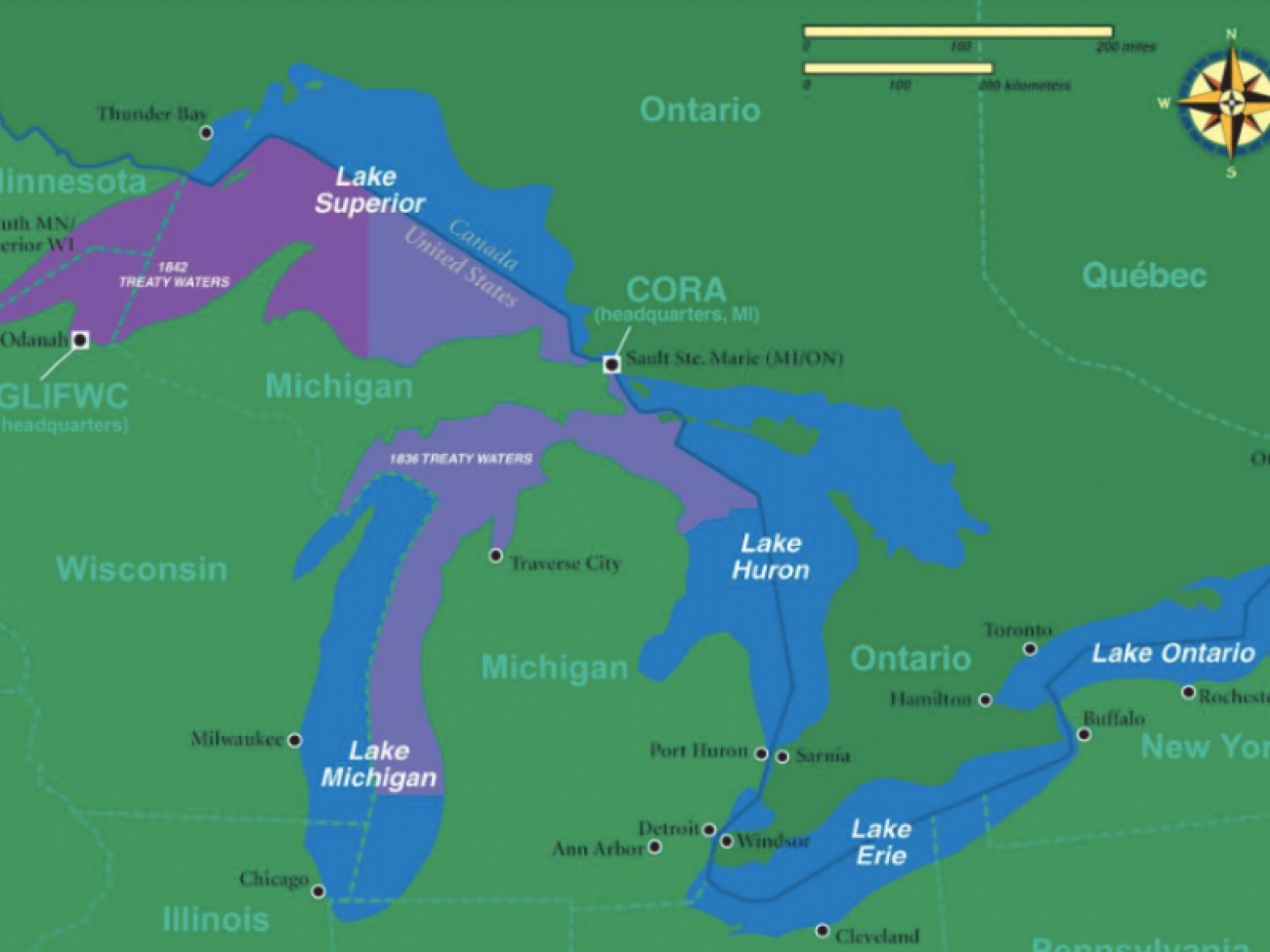BLOG
April 17th, 2024
Via Circle of Blue, a report on a First Nation’s legal appeal on fishing in the Great Lakes:
-
Four Michigan tribes and the state and federal government renegotiated fishing rights in the Great Lakes last year, without the Sault tribe’s consent
-
Now, the tribe is suing, arguing it can’t be held to an agreement it never approved
-
Underlying the debate: A looming sense of scarcity as invasive species and other threats decimate key Great Lakes fish species
Michigan’s largest Native American tribe is appealing the legal agreement that allocates fishing rights in Michigan’s portion of the Great Lakes, arguing that as a sovereign nation, the tribe can’t be forced to follow rules crafted without its consent.
In an appeal filed Wednesday in the U.S. Sixth Circuit Court of Appeals, the Sault Ste. Marie Tribe of Chippewa Indians seeks a trial to challenge the latest Great Lakes fishing decree, a document that dictates how five Native American tribes and the federal and state governments share access to Michigan’s Great Lakes fish.
The agreement, finalized last year, covers nearly 19,000 square miles in lakes Michigan, Huron and Superior, where Michigan tribes retained fishing rights in the 1836 Treaty of Washington.

The light purple areas roughly delineate waters covered by the 1836 Treaty of Washington. (Bridge file photo)
Speaking to reporters Wednesday, Sault Chairperson Austin Lowes argued that because the tribe didn’t sign the agreement, it has a treaty right to decide when, where and how Sault tribe members fish.
“This treaty predates Michigan’s very existence,” Lowes said, “and the fact that we have to get Michigan to agree to how we can fish in the waters that we ceded is absolutely preposterous.”
Officials with the Michigan Department of Natural Resources did not respond to an inquiry about the appeal. Nor did attorneys for other tribes that signed the decree.
The Sault tribe’s lawsuit is the latest controversy in a years-long struggle to rewrite fishing rules in lakes fundamentally changed by invasive species and other factors.
Since arriving on ocean-going cargo ships in the 1980s, quagga and zebra mussels have invaded every Great Lake but Superior, hogging nutrients and leaving less food for fish. The whitefish that have long sustained livelihoods for tribal fishers are near the brink of collapse, while some salmon species favored by recreational anglers have also grown scarce.
That has created tensions, with tribal, recreational and state-regulated commercial fishers all seeking a slice of an ever-smaller pie.
The Sault tribe wants access to more fish species, and more fishing territory, with less oversight by the state government.
First crafted in 1985, the decree has been renegotiated several times. But after tensions erupted at the bargaining table, the latest update was negotiated largely without the Sault tribe’s involvement.
In addition to the state and federal governments, four tribes signed onto the legal agreement in 2022: The Bay Mills Indian Community, the Little Traverse Bay Bands of Odawa Indians, the Grand Traverse Band of Ottawa and Chippewa Indians and the Little River Band of Ottawa Indians.
But the Sault tribe refused to sign the document, and filed a host of objections to its terms. Nonetheless, U.S. District Court Judge Paul Maloney finalized the decree in August 2023, binding all parties to its terms.
With the whitefish that sustain tribal fisheries in alarming decline, tribes negotiated access to new fishing locations, species, and gear. In perhaps the most controversial change, the new agreement allows tribal fishing boats to use gillnets in certain locations and at certain times of year.
But Sault tribe officials complain the decree locks their fishers out of prime waters, while imposing too many restrictions on gillnets, blocking tribal fishers from catching certain species, and wrongly requiring them to report catch data to the state.
“Quite simply, it’s falling short of meeting the needs of our members,” Lowes said.
He added that some areas off-limits to the tribe are “essentially in the backyard of several of our fishermen.”
Any expansion of Sault tribe fishing rights would likely anger non-tribal fishing groups, which have already filed their own appeal to the decree.
A group called the Coalition to Protect Michigan Resources, which represents recreational anglers and charter boat captains, objects to the use of gillnets, arguing it could threaten the lakes’ fisheries.
Gillnets are walls of netting that stretch across the water, ensnaring the gills or other body parts of passing fish. Unlike trap nets, which allow anglers to remove accidentally-caught species and toss them back alive, gillnets are generally lethal.
Restrictions on gillnet fishing were a key component of the earlier decree, and Michigan spent millions buying out tribal gillnet fishers amid a conversion to trapnets.
Gillnetting requires less labor, making fishing more cost-effective. With far fewer whitefish in the lakes today, tribal anglers have found it increasingly difficult to make money catching fish by trapnet.
But Amy Trotter, CEO of the Michigan United Conservation Clubs and treasurer of the Coalition to Protect Michigan Resources, argued allowing tribal fishers to use gillnets would harm already-struggling salmon populations by killing the fish when they become accidentally ensnared in the nets.
“We do have concerns about the biological impact of that,” she said, along with concerns about how regulators would enforce limits on gillnet fishing.
While the competing appeals make their way through the courts, the latest decree remains in effect. Sault tribe attorney Ryan Mills said its anglers are abiding by its terms.

